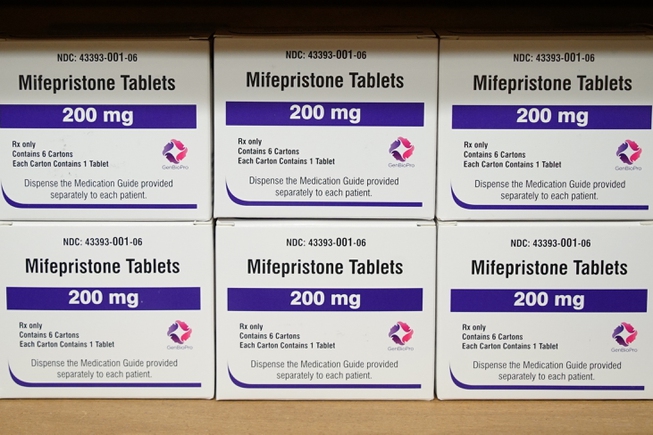
Allen G. Breed / AP, file
Boxes of the drug mifepristone sit on a shelf at the West Alabama Women’s Center in Tuscaloosa, Ala., March 16, 2022. A federal judge in Texas on Friday, April 7, 2023, ordered a hold on the U.S. approval of the abortion medication mifepristone, throwing into question access to the nation’s most common method of abortion in a ruling that waved aside decades of scientific approval. Federal lawyers representing the FDA are expected to swiftly appeal the ruling.
Thursday, April 20, 2023 | 2 a.m.
A Nevada-based company that makes a majority of the abortion pill mifepristone sold in the United States sued the Food and Drug Administration on Wednesday, a new legal volley in a string of recent court maneuverings over the fate of the drug.
The lawsuit adds another strand to the intense legal battle underway over a case filed in federal court in Texas in which a consortium of anti-abortion groups are seeking to overturn the FDA’s 23-year-old approval of mifepristone, the first pill used in a two-drug medication abortion regimen.
In the new case, GenBioPro, which makes the generic version of mifepristone, seeks to block the FDA from complying if the courts ultimately order mifepristone off the market. The case was filed in the U.S. District Court of Maryland.
Earlier this month, the federal judge in the Texas case issued a preliminary ruling invalidating the approval of mifepristone. Last week, a federal appeals court panel said the drug could remain on the market while the case was being litigated, but it ordered a reversal of all regulatory actions the FDA has taken on mifepristone since 2016, which include the approval in 2019 of GenBioPro’s generic version of the exact same drug.
That order has been briefly paused by the Supreme Court, which is expected to decide by midnight Friday whether it will extend the stay until the full case can be heard.
The GenBioPro lawsuit claims that the FDA has repeatedly failed to stipulate that it would follow a regulatory process established by Congress and afford the drug company due process guaranteed by the Constitution if the agency was ordered to suspend or revoke its approval of GenBioPro’s product.
By leaving open the possibility that it would immediately obey such a court order, the lawsuit argues, the FDA has “left GenBioPro at risk of severe civil and criminal penalties if it does not cease shipments of mifepristone.”
The FDA issued a statement saying, “FDA doesn’t comment on pending litigation.”
In testimony Wednesday before the Senate Appropriations Committee, FDA Commissioner Dr. Robert Califf, fielding questions about the Texas lawsuit, said the agency was concerned about the potential implications of the case “from the well-being of patients who need access to this drug, the pharmaceutical industry and our ability to implement our statutory authority.”
He noted that the FDA was fighting the case in court, adding, “I’ll just say the FDA intends to comply with any court orders.”
Evan Masingill, GenBioPro’s CEO, said Wednesday that uncertainty about the outcome of the Texas case has led to fewer orders of mifepristone.
“The market disruption is already pervasive, impacting orders that include tens of thousands of units,” he said.
GenBioPro is headquartered in Las Vegas, according to Wednesday’s court filing.
The case could also have implications for the broader drug industry. The suit claims that it would be unprecedented for the FDA to follow a court order to immediately revoke the approval of a drug. A drug’s approval can be revoked only if the FDA determines that it presents “an imminent hazard to the public health,” the lawsuit says. The FDA has forcefully argued in court that mifepristone is very safe and cited scores of studies showing that serious complications are rare and that less than 1% of patients need hospitalization.
“People develop drugs in this country and not in others because we’ve typically had a pretty predictable regulatory structure, and with the Texas lawsuit, is that becoming not the case?” said Skye Perryman, a lawyer for GenBioPro and president of Democracy Forward, a center-left legal advocacy organization. “That has industrywide implications.”
GenBioPro said that it supplied about two-thirds of the drug sold in the United States and that it sold more than 850,000 units of the drug between 2017 and 2020.
GenBioPro’s lawsuit cites filings the FDA submitted to the Supreme Court in which the agency said that if the appeals court decision were to take effect, “the generic version of the drug would cease to be approved altogether.”
The company said in the lawsuit that such statements amounted to a policy decision by the federal agency and that “the FDA decision is erroneous and unlawful.”
The suit says that the FDA has declined to say otherwise in response to three letters that GenBioPro sent it in March and April. In those letters, GenBioPro asked the agency to clarify that it would adhere to the congressionally mandated process before any decision about withdrawing a drug is made.
The company said that the FDA had responded to only the first letter, sent in March before any decision was announced in the anti-abortion groups’ lawsuit, and that it said only that the “FDA will, of course, need to review the Court’s opinion and order before determining what steps may be necessary to comply with it.”
“We are not challenging FDA’s scientific or medical judgment,” Perryman said, “but FDA has failed to confirm it will respect our clients’ rights, and so we are seeking a court order.”
